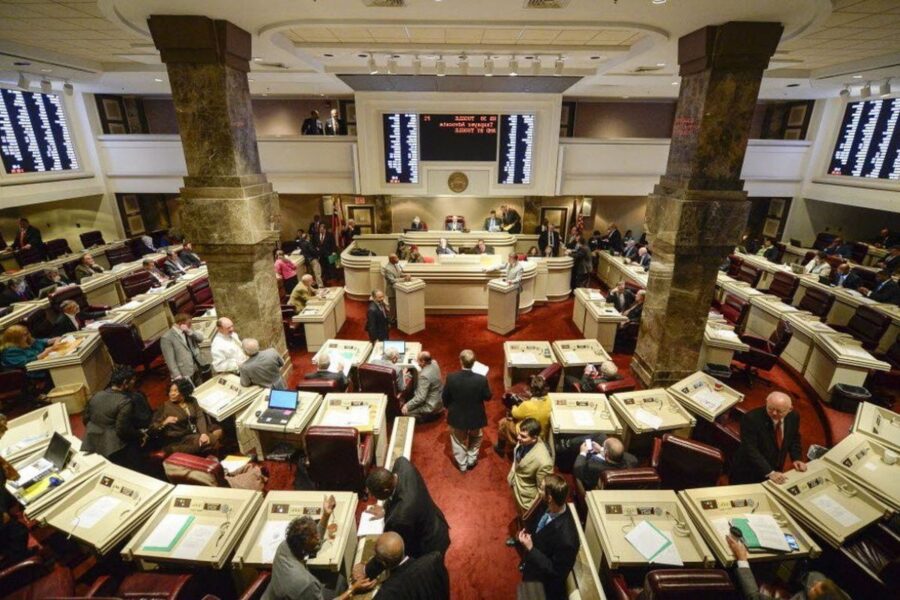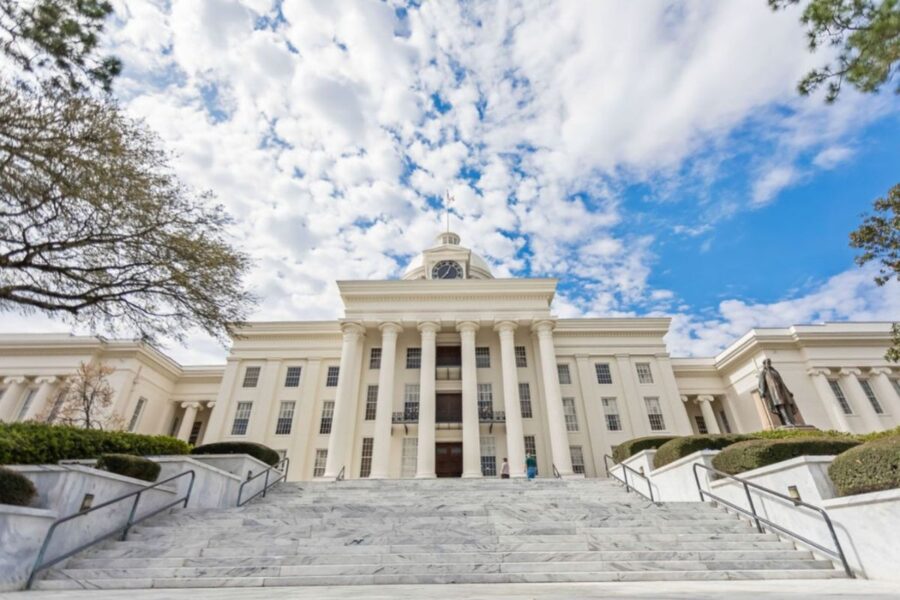Education Budget Chair in Alabama: The contemplation of a cap on the voucher-like education bill by the Education Budget Chair in the Alabama Senate has sparked intense debate and speculation within political and educational circles.
This potential move comes amidst a backdrop of differing opinions on the efficacy and impact of such a program in the state. With Governor Ivey’s strong endorsement contrasting with Democratic concerns and opposition from education groups, the proposed cap raises questions about the future direction of education funding and policy in Alabama.
The implications of this decision are significant, touching upon core issues of educational access and quality.
Key Takeaways
- Senator Orr considers capping the voucher program to ensure efficient fund allocation.
- The program supports students with special needs and those below 300% of the federal poverty level.
- Implementing a cap could impact student access to educational resources.
- Assessing financial resources, eligible students, and program objectives is crucial for determining the cap.
Senate Education Budget Chair Contemplates Cap on School Voucher Program
Senator Arthur Orr, the esteemed chair of the Senate Finance and Taxation Education Committee in Alabama, is deliberating on the implementation of a potential cap on the voucher program designed to support students with special needs and those below 300% of the federal poverty level, as proposed in Senate Bill 61.
This proposed legislation, spearheaded by Governor Kay Ivey, aims to allocate funds of up to $7,000 for specified education expenses for eligible students. Senator Orr’s contemplation of introducing a cap on this program raises questions about the practical implications of such a measure.
The introduction of a cap could potentially limit the number of students benefiting from the voucher program, thereby impacting access to crucial educational resources for those in need. Additionally, determining the appropriate threshold for this cap requires a meticulous examination of the financial resources available, the number of eligible students, and the overall objectives of the program.
As Senator Orr navigates through these considerations, the outcomes of this decision could significantly influence the educational landscape for vulnerable student populations in Alabama.
The Voucher Program and its Components
The voucher program outlined in Senate Bill 61 introduces a comprehensive framework aimed at allocating a minimum of $100 million from the Education Trust Fund towards supporting eligible students, focusing initially on those with special needs and individuals falling below a specified income threshold. This initiative is a significant step towards enhancing educational opportunities for vulnerable student populations in Alabama.
- The program targets students with special needs and those below a specific income level initially.
- It will expand to include all eligible students regardless of income starting in 2027.
- The allocated $100 million is the core funding, with discussions around capping any excess funds.
- The voucher program aims to provide more educational choices for families.
- There is an emphasis on accountability measures to ensure the effective use of allocated funds and the success of participating students.


ALSO READ: SPLC Report Sheds Light on Disparities in Alabama Juvenile Justice System
Governor Ivey’s Priority and Advocacy for Education Freedom
Governor Ivey’s unwavering commitment to advancing education freedom in Alabama underscores her dedication to empowering students and families with diverse educational opportunities. Prioritizing Senate Bill 61, she has highlighted the importance of investing in traditional public schools while also expanding education choices.
The governor’s advocacy for this legislation demonstrates a balanced approach aimed at addressing the varied needs of students and families across the state. By championing education freedom, Governor Ivey is striving to create a system that offers flexibility and options, ensuring that every child has access to quality education that aligns with their individual requirements.
Her support for expanding educational opportunities reflects a vision of inclusivity and progress within Alabama’s educational landscape. Through her prioritization of Senate Bill 61, Governor Ivey is shaping a pathway towards a more diverse and student-centric educational environment, where families can make informed choices that best suit their educational preferences and goals.
Democratic Concerns and Opposition from Education Groups
Democratic committee members’ concerns regarding potential fund allocation stacking with the existing Alabama Accountability Act have raised questions about the implications of a combined $17,000 per student under consideration. As the debate intensifies, several key points have emerged:
- Impact on Public Schools: Opposition from education groups highlights worries about diverting funds away from public schools, potentially affecting resources and programs.
- Accountability Measures: Questions arise about how accountability will be ensured for schools receiving these funds, particularly regarding academic performance and fiscal responsibility.
- Benefit to Private Schools: Concerns are voiced about the bill potentially benefiting students already enrolled in private schools, raising issues of fairness and equity.
- Long-Term Educational Outcomes: Discussions center on the potential long-term effects on student learning outcomes and the overall quality of education in Alabama.
- Community Engagement: Calls for increased community involvement in decision-making processes to ensure transparency and address concerns from various stakeholders.
Supporter Perspectives and the Path Forward
Supporter perspectives on Senate Bill 61’s implications for education funding in Alabama reveal a nuanced understanding of parental choice and educational flexibility. Advocates argue that the bill enhances parental autonomy in choosing the most suitable educational setting for their children, emphasizing that it complements rather than competes with public schools. While acknowledging concerns about the absence of a cap and standardized testing requirements, supporters stress that empowering parents to tailor educational decisions to their children’s specific needs is paramount.
The legislation’s future hinges on forthcoming committee deliberations and votes, with stakeholders offering divergent opinions on its potential effects on Alabama’s educational landscape. Moving forward, proponents are poised to engage in discussions to address apprehensions and refine the bill to strike a balance between expanding educational options and safeguarding the state’s overall education system. The path ahead entails navigating through these differing viewpoints to shape a policy that optimally serves the diverse educational needs of Alabama’s students.

Conclusion Of Education Budget Chair in Alabama
The contemplation of a cap on the school voucher program by the Senate Education Budget Chair in Alabama reflects a complex landscape of priorities and concerns.
While Governor Ivey advocates for education freedom, Democratic opposition and concerns from education groups highlight the need for careful consideration and debate.
Supporters of the program must navigate these challenges to ensure a path forward that addresses the diverse perspectives and interests involved in education funding in Alabama.
Our Reader’s Queries
What is the budget for education in Alabama?
“The Alabama Legislature greenlit the $8.8 billion Education Trust Fund budget and a $2.7 billion supplemental funding bill on Thursday night, swiftly moving them to Gov. Kay Ivey’s desk after a marathon day with multiple meetings.”
How much will the Alabama education budget be in 2025?
“The Alabama State Board of Education has granted approval to a $6.2 billion budget request for schools in fiscal year 2025. This marks an increase of approximately $620 million, representing an 11% rise compared to the funding allocated by the Alabama Department of Education for K-12 schools in the previous year.”
How are Alabama schools funded?
“All state funding is derived from the Education Trust Fund (ETF) budget, with Alabama employing the Foundation Program (FP) to assess the amount of state funds allocated to each district. Moreover, schools receive additional state funding through specific ‘line items’ in the ETF budget, such as the Alabama Reading Initiative.”
What is the budget for Alabama education budget 2023 24?
“In fiscal year 2023-24, Alabama’s Education Trust Fund amassed $9.3 billion, surpassing the allocated $8.8 billion by lawmakers, demonstrating a surplus of $500 million.”

